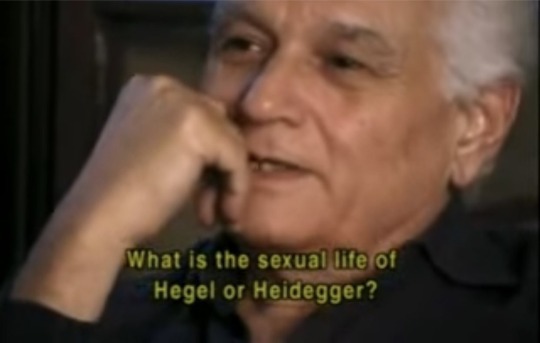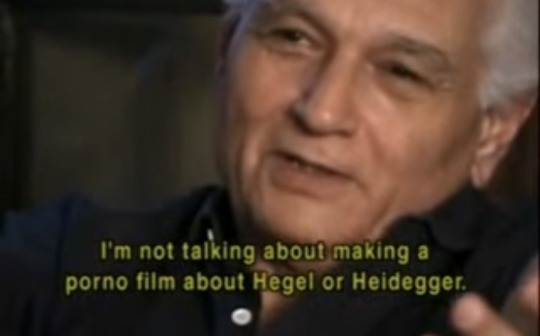#jacques derrida
Photo
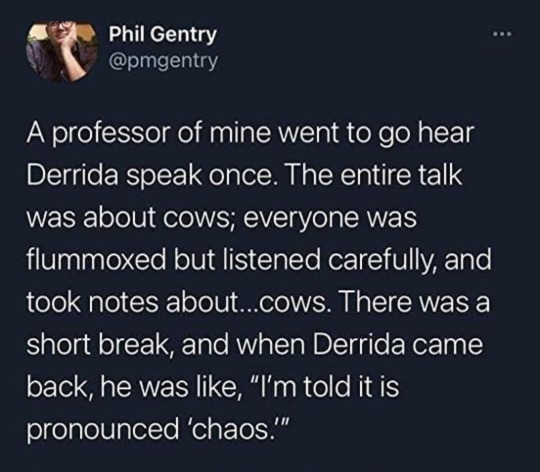
8K notes
·
View notes
Text
“Monsters cannot be announced. One cannot say: 'Here are our monsters,' without immediately turning the monsters into pets.”
― Jacques Derrida
325 notes
·
View notes
Quote
inside languages there is a terror, soft, discreet, or glaring
Jacques Derrida, from Monolingualism of the Other: or, The Prothesis of Origin
429 notes
·
View notes
Photo

Lazy start to a rainy Sunday morning. Last night was games night with some friends, we stayed up till the early hours so we're still wearing sleepiness. Outside, the marathon has closed all the streets surrounding our flat and crowds have gathered to cheer on athletes, friends, loved ones. All a perfect excuse to open all the windows, have one more cup of coffee and do a little reading
#studyblr#studygram#studyspo#books#bookblr#booklr#reading#currently reading#read#jacques derrida#derrida#philosophy#literature#litblr#lit#sunday#weekend#london
263 notes
·
View notes
Photo


Ghost Dance (Ken McMullen, 1983)
#Ghost Dance#Ken McMullen#Pascale Ogier#Jacques Derrida#Derrida#quote#film#cinema#metaphor#ghost#ghosts#1983
1K notes
·
View notes
Photo

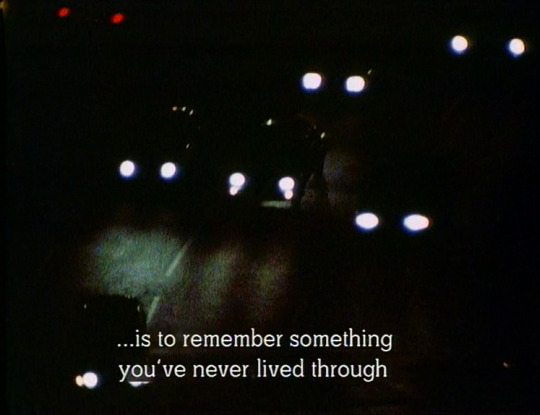

Ken McMullen
- Ghost Dance
1983
293 notes
·
View notes
Text
I finished Ursula K Le Guin’s The Farthest Shore yesterday, and it got me thinking about two things:
1) The relationship between truth and meaning.
2) The wisdom of accepting death.
The conflict of the book is established when it is discovered that people have lost their connection to the “true speech”, the language of creation, which means that wizards can no longer use magic, but also that everyone falls into nihilism, listlessness, and paranoia. People retain their regular language, but the language of magic is lost, and so they lose their grip on reality. They see everything as flat, without any transcendence in anything. Nothing is more significant than anything else, and so nothing is worth doing. People keep talking, but none of it means anything real.
The cause of this is someone trying to escape the fear of death by dying and coming back immortal, leaving a tear in the world that magic leaks out of. The fact that they have to first die to find immortal life suggests that death and immortality are in a way the same thing, and that this deconstruction is the cause of the spread of nihilism. The necromancer is able to send out a message to people’s dark sides, causing this change in them:
By denying life you may deny death and live forever!
This is reflected in the fact that the souls of the dead show an even more extreme embodiment of the emptiness and stillness experienced by those seduced by the message. The tear in the world is blurring the distinctions between life and death, and calling for people to hurry it along.
For Le Guin then, life is change and difference - rather like Octavia Butler’s message from Parable of the Sower that “God Is Change”. Maybe the key part of Butler’s poem for this though is “The Only Lasting Truth Is Change.” Seeking immortality is sort of denying reality. Le Guin describes each individual life as a wave on the ocean, and claims that seeking immortality would be like making the entire ocean one wave, so that it grows still. In other words, life cannot exist without other lives, and without a chance of ending. A single life that totalises all would be indistinguishable from death.
I’m with her on the first point, that a changeless life would be indistinguishable from death. Experience is formed through interaction, which inevitably changes both parties. This is ancient knowledge, which Le Guin no doubt gets from her passion for Taoism, but my favourite exposition is Donna Haraway’s Situated Knowledges. But if life is always changing, always unfinished, why could there not theoretically be an eternal life which does not totalise, which accepts its mutability?
I think here is where we run up against the tension between Le Guin’s commitments to true language on on side and contingency on the other. Nietzsche is famous for having pointed out that language is a host of metaphors. Derrida then took this further to point out that no word is self-contained, rather its meaning is dependent on so many others that it can never be pinned down perfectly to mean just one thing for certain. This includes the self. It stops and starts when we’re knocked unconscious, and its altered with every experience, every exchange of atoms. In a sense we die a lot - if we thing of ourselves as a being, rather than an emergent property of various processes. We can’t be perfectly described with a word, because we aren’t a constant thing anyway, irrespective of that final death.
But this is kind of a moot point as Le Guin’s story is concerned. Few of us ever actually seek immortality. And Le Guin is right to frame it as an impossible task. It plays a symbolic role for the equally, perhaps even more, impossible task of seeking control, constancy, solidity. Nothing is constant - The Only Lasting Truth Is Change. But for me this just makes the final change of death easier to accept, as just one more change that will leave the previous version of myself behind - only this time there won’t be a recognisably new version to take its place.
There is definitely a difficulty in accepting the indefinite fuzziness that comes to things when you look at them like this though, that can lead to the nihilism Le Guin was so afraid of. I think Le Guin answers this rather well though, when she says that we cannot help but do everything we do, want everything we want, feel everything we feel. We can’t actually avoid caring about things, especially if we throw ourselves into them. We don’t have to justify what we care about based on some sort of metaphysical truth, as if we could ever be certain of that - we just have to accept the inclinations given to us by the universe and act on them in a balanced way to make ourselves content. Don’t rationalise your feelings through strict force of will, pay attention to them and what the good asks of you. That’s actually from a different anarcha-feminist writer - Simone Weil - but it fits!
#ursula k. le guin#ursula le guin#le guin#donna haraway#earthsea#the farthest shore#friedrich nietzsche#nietzsche#derrida#jacques derrida#philosophy#existentialism#books#fantasy books#octavia butler#octavia e. butler#taoism#daoism#meaning#language#semiotics#parable of the sower#simone weil#immortality#death
71 notes
·
View notes
Text
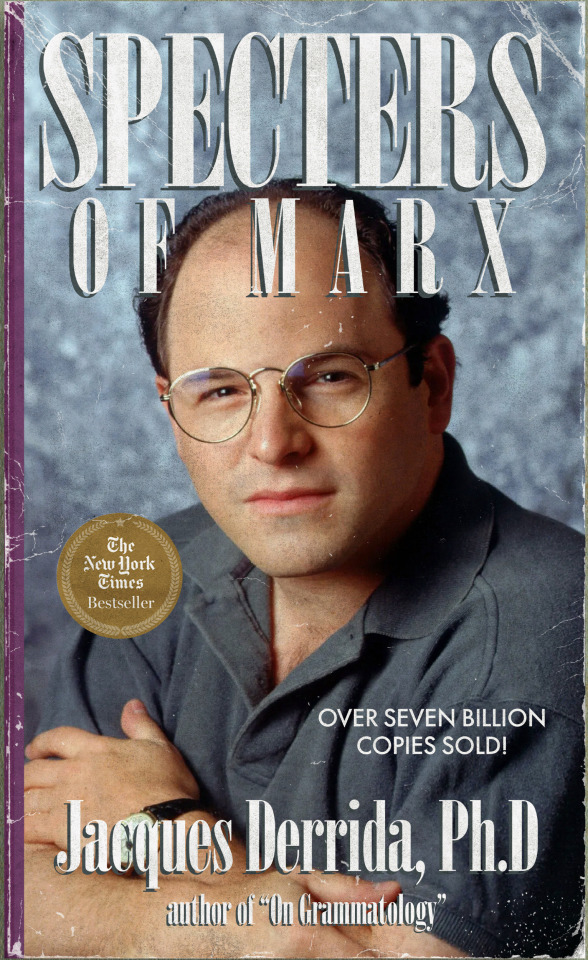
Jacques Derrida, Specters Of Marx, 1993
22 notes
·
View notes
Text

Edward Said
#edward said#jurgen habermas#gilles deleuze#tzvetan todorov#jacques derrida#raymond williams#stuart hall
37 notes
·
View notes
Text

Derrida, The Politics of Friendship
18 notes
·
View notes
Text
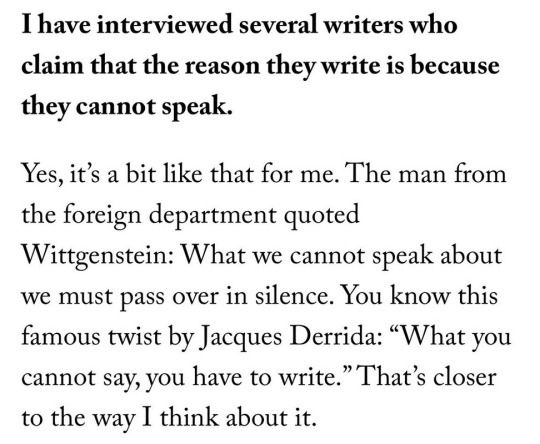
John Fosse
20 notes
·
View notes
Text
“How can another see into me, into my most secret self, without my being able to see in there myself? And without my being able to see him in me. And if my secret self, that which can be revealed only to the other, to the wholly other, to God if you wish, is a secret that I will never reflect on, that I will never know or experience or possess as my own, then what sense is there in saying that it is my secret, or in saying more generally that a secret belongs, that it is proper to or belongs to some one, or to some other who remains someone. It's perhaps there that we find the secret of secrecy. Namely, that it is not a matter of knowing and that it is there for no one. A secret doesn't belong, it can never be said to be at home or in its place. The question of the self: who am I not in the sense of who am I but rather who is this I that can say who? What is the- I and what becomes of responsibility once the identity of the I trembles in secret?”
― Jacques Derrida
17 notes
·
View notes
Text
Speaking is impossible, but so too would be silence or absence or a refusal to share one’s sadness.
Jacques Derrida, The Works of Mourning
#quote#jacques derrida#the works of mourning#speaking#impossible#silence#absence#refusal#share#sadness#quotes
20 notes
·
View notes
Photo

Jacques Derrida, Specters of Marx
600 notes
·
View notes
Text



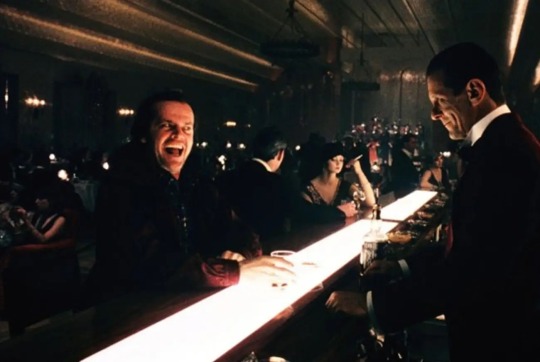
Archive Fever at the Blue Gold Room.
14 notes
·
View notes
